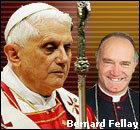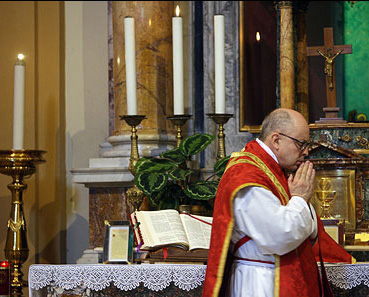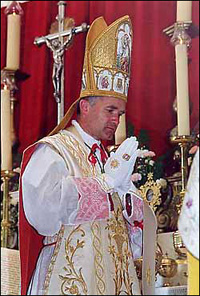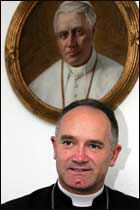What is Motu Proprio
 The name given to certain papal rescripts on account of the clause motu proprio (of his own accord)
used in the document. The words signify that the provisions of the rescript were decided on by the pope
personally, that is, not on the advice of the cardinals or others, but for reasons which he himself
deemed sufficient. The document has generally the form of a decree: in style it resembles a Brief rather
than a Bull, but differs from both especially in not being sealed or countersigned. It issues from the
Dataria Apostolica, and is usually written in Italian or Latin. It begins by stating the reason inducing
the sovereign pontiff to act, after which is stated the law or regulation made, or the favour granted,
It is signed, personally by the pope, his name and the date being always in Latin.
The name given to certain papal rescripts on account of the clause motu proprio (of his own accord)
used in the document. The words signify that the provisions of the rescript were decided on by the pope
personally, that is, not on the advice of the cardinals or others, but for reasons which he himself
deemed sufficient. The document has generally the form of a decree: in style it resembles a Brief rather
than a Bull, but differs from both especially in not being sealed or countersigned. It issues from the
Dataria Apostolica, and is usually written in Italian or Latin. It begins by stating the reason inducing
the sovereign pontiff to act, after which is stated the law or regulation made, or the favour granted,
It is signed, personally by the pope, his name and the date being always in Latin.
Benedict XVI's Apostolic Letter "Summorum Pontificum," issued "motu proprio", concerning the use of the Roman Missal promulgated by John XXIII in 1962.
Up to our own times, it has been the constant concern of Supreme Pontiffs to ensure that the Church of Christ offers a worthy ritual to the Divine Majesty, "to the praise and glory of His name," and "to the benefit of all His Holy Church."
Since time immemorial it has been necessary -- as it is also for the future -- to maintain the principle according to which "each particular Church must concur with the universal Church, not only as regards the doctrine of the faith and the sacramental signs, but also as regards the usages universally accepted by uninterrupted apostolic Tradition, which must be observed not only to avoid errors but also to transmit the integrity of the faith, because the Church's law of prayer corresponds to her law of faith."[1]
 Among the Pontiffs who showed that requisite concern, particularly
outstanding is the name of St. Gregory the Great, who made every effort to
ensure that the new peoples of Europe received both the Catholic faith and
the treasures of worship and culture that had been accumulated by the Romans
in preceding centuries. He commanded that the form of the sacred liturgy as
celebrated in Rome (concerning both the Sacrifice of Mass and the Divine
Office) be conserved. He took great concern to ensure the dissemination of
monks and nuns who, following the Rule of St. Benedict, together with the
announcement of the Gospel, illustrated with their lives the wise provision
of their rule that "nothing should be placed before the work of God." In
this way the sacred liturgy, celebrated according to the Roman use, enriched
not only the faith and piety but also the culture of many peoples. It is
known, in fact, that the Latin liturgy of the Church in its various forms,
in each century of the Christian era, has been a spur to the spiritual life
of many saints, has reinforced many peoples in the virtue of religion and
fecundated their piety.
Among the Pontiffs who showed that requisite concern, particularly
outstanding is the name of St. Gregory the Great, who made every effort to
ensure that the new peoples of Europe received both the Catholic faith and
the treasures of worship and culture that had been accumulated by the Romans
in preceding centuries. He commanded that the form of the sacred liturgy as
celebrated in Rome (concerning both the Sacrifice of Mass and the Divine
Office) be conserved. He took great concern to ensure the dissemination of
monks and nuns who, following the Rule of St. Benedict, together with the
announcement of the Gospel, illustrated with their lives the wise provision
of their rule that "nothing should be placed before the work of God." In
this way the sacred liturgy, celebrated according to the Roman use, enriched
not only the faith and piety but also the culture of many peoples. It is
known, in fact, that the Latin liturgy of the Church in its various forms,
in each century of the Christian era, has been a spur to the spiritual life
of many saints, has reinforced many peoples in the virtue of religion and
fecundated their piety.
Many other Roman pontiffs, in the course of the centuries, showed particular solicitude in ensuring that the sacred liturgy accomplished this task more effectively. Outstanding among them is St. Pius V who, sustained by great pastoral zeal and following the exhortations of the Council of Trent, renewed the entire liturgy of the Church, oversaw the publication of liturgical books amended and "renewed in accordance with the norms of the fathers," and provided them for the use of the Latin Church.
One of the liturgical books of the Roman rite is the Roman Missal, which developed in the city of Rome and, with the passing of the centuries, little by little took forms very similar to that it has had in recent times.
"It was towards this same goal that succeeding Roman Pontiffs directed their energies during the subsequent centuries in order to ensure that the rites and liturgical books were brought up to date and when necessary clarified. From the beginning of this century they undertook a more general reform."[2] Thus our predecessors Clement VIII, Urban VIII, St. Pius X,[3] Benedict XV, Pius XII and Blessed John XXIII all played a part.
In more recent times, the Second Vatican Council expressed a desire that the respectful reverence due to divine worship should be renewed and adapted to the needs of our time. Moved by this desire our predecessor, the Supreme Pontiff Paul VI, approved, in 1970, reformed and partly renewed liturgical books for the Latin Church. These, translated into the various languages of the world, were willingly accepted by bishops, priests and faithful. John Paul II amended the third typical edition of the Roman Missal. Thus Roman Pontiffs have operated to ensure that "this kind of liturgical edifice ... should again appear resplendent for its dignity and harmony."[4]
But in some regions, no small numbers of faithful adhered and continue to adhere with great love and affection to the earlier liturgical forms. These had so deeply marked their culture and their spirit that in 1984 the Supreme Pontiff John Paul II, moved by a concern for the pastoral care of these faithful, with the special indult "Quattuor Abhinc Anno," issued by the Congregation for Divine Worship, granted permission to use the Roman Missal published by Blessed John XXIII in the year 1962. Later, in the year 1988, John Paul II with the apostolic letter given as "motu proprio, "Ecclesia Dei," exhorted bishops to make generous use of this power in favor of all the faithful who so desired.
Following the insistent prayers of these faithful, long deliberated upon by our predecessor John Paul II, and after having listened to the views of the cardinal fathers of the consistory of 22 March 2006, having reflected deeply upon all aspects of the question, invoked the Holy Spirit and trusting in the help of God, with these apostolic letters we establish the following:
Art 1. The Roman Missal promulgated by Paul VI is the ordinary expression of the "Lex orandi" (Law of prayer) of the Catholic Church of the Latin rite. Nonetheless, the Roman Missal promulgated by St. Pius V and reissued by Blessed John XXIII is to be considered as an extraordinary expression of that same "Lex orandi," and must be given due honor for its venerable and ancient usage. These two expressions of the Church's "Lex orandi" will in no any way lead to a division in the Church's "Lex credendi" (Law of belief). They are, in fact two usages of the one Roman rite.
It is, therefore, permissible to celebrate the Sacrifice of the Mass following the typical edition of the Roman Missal promulgated by Blessed John XXIII in 1962 and never abrogated, as an extraordinary form of the liturgy of the Church. The conditions for the use of this Missal as laid down by earlier documents "Quattuor Abhinc Annis" and "Ecclesia Dei," are substituted as follows:
Art. 2. In Masses celebrated without the people, each Catholic priest of the Latin rite, whether secular or regular, may use the Roman Missal published by Blessed Pope John XXIII in 1962, or the Roman Missal promulgated by Pope Paul VI in 1970, and may do so on any day with the exception of the Easter Triduum. For such celebrations, with either one Missal or the other, the priest has no need for permission from the Apostolic See or from his ordinary.
Art. 3. Communities of institutes of consecrated life and of societies of apostolic life, of either pontifical or diocesan right, wishing to celebrate Mass in accordance with the edition of the Roman Missal promulgated in 1962, for conventual or "community" celebration in their oratories, may do so. If an individual community or an entire institute or society wishes to undertake such celebrations often, habitually or permanently, the decision must be taken by the superiors major, in accordance with the law and following their own specific decrees and statues.
Art. 4. Celebrations of Mass as mentioned above in art. 2 may -- observing all the norms of law -- also be attended by faithful who, of their own free will, ask to be admitted.
Art. 5. §1 In parishes, where there is a stable group of faithful who adhere to the earlier liturgical tradition, the pastor should willingly accept their requests to celebrate the Mass according to the rite of the Roman Missal published in 1962, and ensure that the welfare of these faithful harmonizes with the ordinary pastoral care of the parish, under the guidance of the bishop in accordance with Canon 392, avoiding discord and favoring the unity of the whole Church.
§2 Celebration in accordance with the Missal of Blessed John XXIII may take place on working days; while on Sundays and feast days one such celebration may also be held.
§3 For faithful and priests who request it, the pastor should also allow celebrations in this extraordinary form for special circumstances such as marriages, funerals or occasional celebrations, i.e., pilgrimages.
§4 Priests who use the Missal of Blessed John XXIII must be qualified to do so and not juridically impeded.
§5 In churches that are not parish or conventual churches, it is the duty of the rector of the church to grant the above permission.
Art. 6. In Masses celebrated in the presence of the people in accordance with the Missal of Blessed John XXIII, the readings may be given in the vernacular, using editions recognized by the Apostolic See.
Art. 7. If a group of lay faithful, as mentioned in art. 5 §1, has not obtained satisfaction to their requests from the pastor, they should inform the diocesan bishop. The bishop is strongly requested to satisfy their wishes. If he cannot arrange for such celebration to take place, the matter should be referred to the Pontifical Commission Ecclesia Dei. Art.
8. A bishop who, desirous of satisfying such requests, but who for various reasons is unable to do so, may refer the problem to the Commission Ecclesia Dei to obtain counsel and assistance.
Art. 9. §1 The pastor, having attentively examined all aspects, may also grant permission to use the earlier ritual for the administration of the sacraments of baptism, marriage, penance, and the anointing of the sick, if the good of souls would seem to require it. § 2 Ordinaries are given the right to celebrate the sacrament of confirmation using the earlier Roman Pontifical, if the good of souls would seem to require it.
§ 2 Clerics ordained "in sacris constitutis" may use the Roman Breviary promulgated by Blessed John XXIII in 1962.
Art. 10. The ordinary of a particular place, if he feels it appropriate, may erect a personal parish in accordance with Canon 518 for celebrations following the ancient form of the Roman rite, or appoint a chaplain, while observing all the norms of law.
Art. 11. The Pontifical Commission Ecclesia Dei, erected by John Paul II in 1988[5], continues to exercise its function. Said commission will have the form, duties and norms that the Roman Pontiff wishes to assign it.
Art. 12. This commission, apart from the powers it enjoys, will exercise the authority of the Holy See, supervising the observance and application of these dispositions. We order that everything We have established with these apostolic letters issued as "motu proprio" be considered as "established and decreed," and to be observed from Sept. 14 of this year, feast of the Exaltation of the Cross, whatever there may be to the contrary. From Rome, at St. Peter's, July 7, 2007, third year of Our Pontificate.
Response to this by Bishop Bernard Fellay Superior General of the Society of St. Pius X.
Dear Friends and Benefactors,
 The traditional Mass was never abrogated. What joy, dear faithful, filled
our hearts at the announcement of Pope Benedict XVI’s motu proprio of July
7th. We see in it an answer from Heaven to our Rosary Crusade, not only
because of its promulgation, but especially because of the extent of its
overture towards the traditional liturgy. Indeed, it is not only the missal
that is declared to be Church law, but also other liturgical books.
The traditional Mass was never abrogated. What joy, dear faithful, filled
our hearts at the announcement of Pope Benedict XVI’s motu proprio of July
7th. We see in it an answer from Heaven to our Rosary Crusade, not only
because of its promulgation, but especially because of the extent of its
overture towards the traditional liturgy. Indeed, it is not only the missal
that is declared to be Church law, but also other liturgical books.
It must be said that if the Mass was never abrogated, it has kept all its rights. In reality, the motu proprio grants nothing new to the Mass of All Time; it merely states that the Mass of St. Pius V, called “of John XXIII” for the occasion, is still in force despite its absence and an interdiction against its celebration lasting nearly forty years. The Tridentine Mass is still the Catholic Mass. The subtle and awkward distinction made between ordinary and extraordinary form of the same rite in speaking of the new and the old Mass will not fool anyone. In this domain, facts speak for themselves. What must be retained is the assertion of the Mass’s perpetual status as a universal law of the Catholic Church. The very word “law of the Church” excludes indults, permissions, or conditions. The bishops are trying to neutralize the salutary effect of the motu proprio by imposing binding and odious restrictions on its implementation. They are certainly not following the Sovereign Pontiff’s will. It will be most interesting to watch the progress of this more or less open rebellion, which is largely hidden from public view. The history of the Church for the next several decades will be determined by this confrontation. Let us pray that the pope may have the strength to uphold and to impose what he has just restored to the Church.
It goes much further than the simple celebration of the Mass. The motu proprio leaves the door ajar to the former liturgical spirit in the sense that it enables it to develop. The liturgy comprises several elements, of which, obviously, the most important is the Holy Sacrifice of the Mass, but this treasure is set amongst an ensemble of liturgical books. Most of them, or at least the most well-known, are going to acquire a new life: the ritual that contains the rites used by the priest to confer the sacraments and blessings; at least part of the pontifical that contains the sacrament of confirmation; and the breviary. These liturgical books form a whole that will un-doubtedly allow the traditional liturgical spirit to resume its place in the life of the Church. The initial effects of the motu proprio are interesting, even if they are almost insignificant when one considers the Church at large. Still, some bishops are actively supporting the movement; and despite the difficulties imposed by other Ordinaries, priests are learning and beginning to celebrate the Holy Mass. More than 5,000 priests worldwide have requested the training videos on the ceremonies of the Mass produced by the Society. That shows that priests evidence a certain interest in the Mass of All Time! What is noteworthy is the unanimous feedback we hear from priests who are discovering the Tridentine Mass. The following testimonies are not exceptional: “It’s two different worlds!” “Celebrating facing the altar or the people is altogether different!” “By celebrating this Mass, I’ve discovered what a priest is!” These testimonials speak volumes, and are worth more than all the argumentations.
There is no point in asking them what they think about the holiness of the new rite... It is obvious that if the genuine freedom to celebrate were guaranteed not only in writing but in practice, the number of Tridentine Masses would immediately increase tenfold.
 Whoever is aware of the titanic struggle that has been raging in our
Catholic Church for at least two centuries, understands that a large part of
the crisis in the Church revolves around the Mass. Two Masses, two
theologies, two spirits: A new spirit was inoculated into the veins of the
Mystical Body by means of the New Mass, “the spirit of Vatican II.” The
traditional Mass, on the contrary, radiates the Catholic Spirit. The rite of
St. Pius V entails an incomparable coherence of faith and morals. To the
eyes of anyone who attends it seriously, it quickly becomes manifest that
this Mass is demanded by the faith and provides substantial nourishment for
it. Soon the logic of the faith becomes clear to the faithful soul: the just
man lives by faith. We must live by our beliefs. The whole of Christian
morality, with all its demands of self-denial, sacrifice, and detachment
from the world, flows from it. God is holy, and whoever desires to approach
Him must live a life of purity, for His holiness requires that the faithful
soul put on the spotless garment of grace. The Mass not only opens the eyes
of the faithful to this reality, the sublimity of the Christian vocation,
but above all it gives them the means to live it. What an abundance of grace
is poured out upon the faithful of “good will” at Mass, and even more upon
the priest who celebrates it.
Whoever is aware of the titanic struggle that has been raging in our
Catholic Church for at least two centuries, understands that a large part of
the crisis in the Church revolves around the Mass. Two Masses, two
theologies, two spirits: A new spirit was inoculated into the veins of the
Mystical Body by means of the New Mass, “the spirit of Vatican II.” The
traditional Mass, on the contrary, radiates the Catholic Spirit. The rite of
St. Pius V entails an incomparable coherence of faith and morals. To the
eyes of anyone who attends it seriously, it quickly becomes manifest that
this Mass is demanded by the faith and provides substantial nourishment for
it. Soon the logic of the faith becomes clear to the faithful soul: the just
man lives by faith. We must live by our beliefs. The whole of Christian
morality, with all its demands of self-denial, sacrifice, and detachment
from the world, flows from it. God is holy, and whoever desires to approach
Him must live a life of purity, for His holiness requires that the faithful
soul put on the spotless garment of grace. The Mass not only opens the eyes
of the faithful to this reality, the sublimity of the Christian vocation,
but above all it gives them the means to live it. What an abundance of grace
is poured out upon the faithful of “good will” at Mass, and even more upon
the priest who celebrates it.
The radiant grace of the Mass calls for another sanctification: that of the Christian family, and ultimately all of society. If society was Christian for centuries, for more than a millennium in fact, this must be attributed above all to the Mass, this holy rite that was completed in its essential parts by the end of Antiquity. We are able to celebrate the so-called “Tridentine Mass”, or the “Mass of St. Pius V”, without difficulty using manuscripts of the tenth or eleventh centuries. One cannot but be struck by the fact that the decadence, indeed the disappearance, of Christian society noticeably accelerated once the new rite was introduced. Who would only like to see in that mere chance or coincidence?
We are still engaged in the titanic struggle for the salvation of souls which runs throughout the history of the human race. Let us hope that the advances made by the motu proprio do not cause us to lose sight of this much deeper view of things. The new situation is cause for hope, but also for redoubled courage to carry on the combat along the route traced by Archbishop Lefebvre
The success gained by our rosary crusade, the zeal that we saw deployed, inspires us to renew our confidence in our heavenly Mother, not by a crusade a month or two long, but by a perpetual rosary crusade. Yes, may this prayer never cease to ascend heavenward for the good of the Church and the salvation of souls! We are convinced that Our Lady will not remain unmoved by such an onslaught of Ave Marias, and will hasten the Church’s recovery. In keeping with the fine sentiment of the Swiss General, General Guisan, who on seeing a soldier praying his rosary said: “How I should like to see Switzerland encircled by this chain!” we should like to encircle the entire Church with a chain of rosaries, to encircle her with an immense and continual string of Ave Marias for her defense and protection. Thus, we are now launching a perpetual Rosary Crusade to obtain from Heaven not only that the decree of excommunication be withdrawn, but especially that Catholic Tradition be fully re-established in its due place —a crusade that will continue until the triumph of the Immaculate Heart of Mary. May all the saints come unto our aid, and may Our Lady bless you!
The Feast of All Saints
November 1, 2007
Bernard Fellay